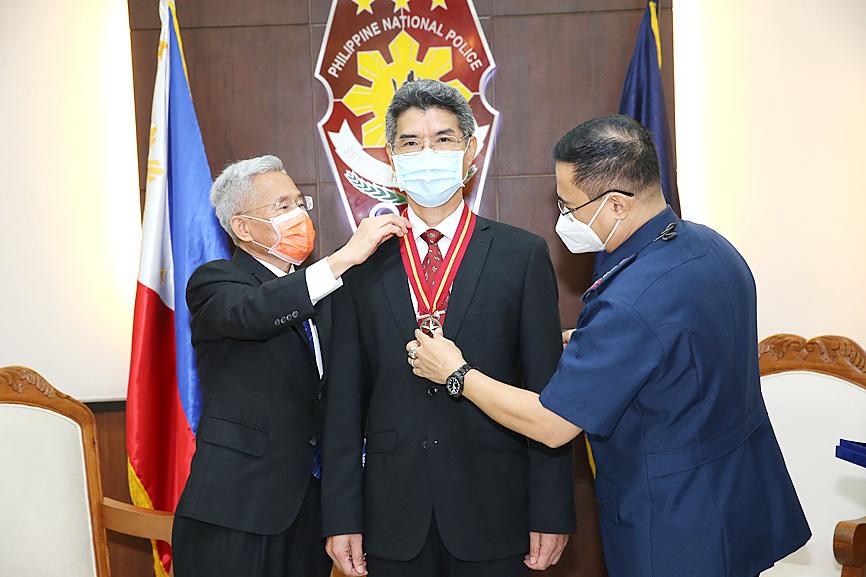A staff member of the Taipei Economic and Cultural Office (TECO) in Manila who is preparing to wrap up his second stint at the office would be returning to Taiwan in February with a Philippine police decoration for having helped his host government arrest several criminal suspects.
Jerry Wang (王智勇), who has served as the equivalent of a police attache at the office, first served in the Philippines from July 2011 to January 2016 and was reassigned to Manila in December 2016.
Thanks to Wang’s help, Taiwan and the Philippines have solved several major transnational crimes during his stint in Manila, the TECO said on Saturday.

Photo: CNA
Wang, who received the “Medalya Ng Katangitanging Gawa” (Outstanding Achievement Medal) from the Philippine National Police (PNP) on June 3, was the first foreign national to receive the honor, the TECO said.
Then-PNP chief Archie Gamboa awarded him the medal in a ceremony attended by Representative to the Philippines Michael Hsu (徐佩勇), Wang said yesterday.
According to the Philippine Government Official Gazette, the medal is awarded to PNP members and Philippine civilians and to foreign nationals for distinguished achievement or service in advancement related to public service of the highest order.
The PNP citation praised Wang for facilitating the signing of a memorandum of understanding on combating transnational crime between the two sides, which included the arrest and repatriation of several high-profile Taiwanese criminals.
TECO records showed that Wang played an important role in the arrest of three high-profile criminals in 2018 and last year: former city councilor Ricardo Parojinog, who was hiding in Taiwan and was wanted by the Philippine authorities for drug-related cases; Israeli-American Oren Shlomo Mayer, who was wanted in connection with the murder of a Canadian in New Taipei City; and former Tainan County council speaker Wu Chien-pao (吳健保), who fled Taiwan in 2014 after being convicted of fixing professional baseball games.
Wang said he was able to accomplish the tasks assigned by his Taipei headquarters largely due to the good connections he established during his first term in Manila.
The National Police Agency and the TECO in Manila also provided support to the PNP, which helped the two sides to establish closer cooperation, he added.
“There is a real need for close cross-border anti-crime cooperation between Taiwan and the Philippines due to their geographical proximity. I believe that by frequent anti-crime engagements, the two sides can further strengthen their relations,” he said.
Other operations facilitated by Wang include anti-drug operations, anti-telecommunications fraud operations, anti-firearms operations, anti-kidnapping operations, exchanges of visits by high-ranking officials, workshops in Taiwan and scholarship programs for PNP personnel at Taiwan Central Police University.
Wang’s successor is scheduled to arrive in Manila next month, TECO said.

Taiwan is to have nine extended holidays next year, led by a nine-day Lunar New Year break, the Cabinet announced yesterday. The nine-day Lunar New Year holiday next year matches the length of this year’s holiday, which featured six extended holidays. The increase in extended holidays is due to the Act on the Implementation of Commemorative and Festival Holidays (紀念日及節日實施條例), which was passed early last month with support from the opposition Chinese Nationalist Party (KMT) and Taiwan People’s Party. Under the new act, the day before Lunar New Year’s Eve is also a national holiday, and Labor Day would no longer be limited

Taiwan is to extend its visa-waiver program for Philippine passport holders for another year, starting on Aug. 1, Minister of Foreign Affairs Lin Chia-lung (林佳龍) said on Friday. Lin made the announcement during a reception in Taipei marking the 127th anniversary of Philippine independence and the 50th anniversary of the establishment of the Manila Economic and Cultural Office (MECO) in Taiwan, the Ministry of Foreign Affairs said. The decision reflected Taiwan’s commitment to deepening exchanges with the Philippines, the statement cited Lin as saying, adding that it was a key partner under the New Southbound Policy launched in 2016. Lin also expressed hope

Costa Rica sent a group of intelligence officials to Taiwan for a short-term training program, the first time the Central American country has done so since the countries ended official diplomatic relations in 2007, a Costa Rican media outlet reported last week. Five officials from the Costa Rican Directorate of Intelligence and Security last month spent 23 days in Taipei undergoing a series of training sessions focused on national security, La Nacion reported on Friday, quoting unnamed sources. The Costa Rican government has not confirmed the report. The Chinese embassy in Costa Rica protested the news, saying in a statement issued the same

Temperatures in New Taipei City’s Sindian District (新店) climbed past 37°C yesterday, as the Central Weather Administration (CWA) issued heat alerts for 16 municipalities, warning the public of intense heat expected across Taiwan. The hottest location in Taiwan was in Sindian, where the mercury reached 37.5°C at about 2pm, according to CWA data. Taipei’s Shilin District (士林) recorded a temperature of 37.4°C at noon, Taitung County’s Jinfeng Township (金峰) at 12:50 pm logged a temperature of 37.4°C and Miaoli County’s Toufen Township (頭份) reached 36.7°C at 11:40am, the CWA said. The weather agency yesterday issued a yellow level information notice for Taipei, New